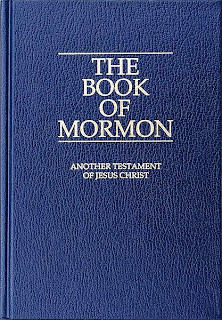Every Wednesday night, we hope to discuss some matter of uncertainty with respect to Christianity, to offer an apologetic. This week: is Mormonism a cult?
Cult, as defined by all-things truth, (aka) Wikipedia, is " in current popular usage, a pejorative term for a new religious movement or other group whose beliefs or practices are considered abnormal or bizarre by the larger society." In relation to orthodox Christianity (i.e. the basic fundamentals of Christianity agreed upon by the major Christian sects, including Roman Catholics, Greek Orthodox, and various protestant denominations), we must question whether it agrees with the Apostle's and Nicene Creed (links to which are posted in our previous post ). These historical creeds are considered the basis upon which Christian theology is built. If a particular religious group's doctrine does not agree on basic tenets of the faith then one can know a movement is not orthodox. Paul warns the Church at Phillipi that they should test every spirit which comes to them and if it preaches any other Gospel than that which he preached they should reject it. We must then know when to reject false Gospels and how to perceive what is the truth.
In the mainstream, especially during the last presidential election, it became increasingly common to hear the media refer to Mormonism as Christianity. It is not only our duty as Christians to reject false Gospels, but also particularly important as Christians in this media-driven world to ensure the real Gospel in communicated accurately. In response to the recent rise of and attention give to Mormonism, we feel it necessary to emphasize the disparities between each fundamental doctrine. For a different description of our criticisms, read this article. We argue Mormonism is not orthodox for several reasons.
First, the method by which supposed divine revelation was given to Joseph Smith. Smith claimed that God the Father, Jesus, John the Baptist, and the angel Moroni appeared to him in a series of visions and gave him golden tablets inscribed in an ancient language, "Reformed Egyptian," from which he translated the Book of Mormon, Pearl of Great Price, and Books of Esther and Moroni. However, he claimed that these tablets were taken back into heaven so we cannot examine them or see how well they were translated. With Biblical texts, scholars routinely perform diagnostics and tests on the manuscripts of Scripture. Not only does the 1800 years separating the texts of the book of Mormon and the books comprising the New Testament account for a lot of the stylistic differences in the texts, but they also contradict the basic theological principles. Depending upon the teachings of Joseph Smith as opposed to the teachings of Christ is, by definition, not Christian.
Second, the interpretation of divinity is contradictory to Christianity. A major tenant of orthodoxy, the Trinity is an undeniable aspect of the Gospel, describing God's nature as the perfect triune being, the Father, Son, and Holy Spirit. Thus embodying each aspect of love (one who loves, is loved, and the spirit of love), for "God is love (1 John 4:8). Joseph Smith's vision of God is very different. Indeed, Christ was "a god," but no more of "a god" than Joseph Smith was. This contradicts the very Ten Commandments. (Exodus 20:3,5; Deut. 6:4) Mormons believe that when one dies, their belief and praise of God exalts him to a higher level of exaltation, leaving His current level empty, and thus taken place by that particular believer. Very literally, each Mormon believes that they become a God at death. This could not be a more different conception of God, and believers, in Christianity.
Third, Joseph Smith could not be considered a prophet by any New Testament standards. In fact, it would be hard to conclude that he was moral, even using lenient standards. In his lifetime, Joseph Smith had 33 (documented) wives. This includes four pairs of sisters, and one mother-daughter combination. It is indisputable that he also coerced teenagers into marrying him through promising their families salvation. In one case, he threatened eternal damnation to a woman if she would not leave her current husband and marry him. Besides the clear teaching of Christ of monogamy (in order to more perfectly represent the union between Christ and the church), any claim of power of justice or power over the damnation or salvation of souls apart from Christ is completely heretical, and inexplicably offensive to Christianity. Paul is very clear in his description of marriage. The purpose of marriage is to consecrate relations between a male and a female, making them one-flesh: a holy way to succumb to our natural sexual inclinations in a Godly manner. The notion that marrying a particular man is the requisite to salvation is a contradiction to Christianity's conception of marriage, John 14:6 ("I am the way, the truth, and the life. Nobody gets to the Father EXCEPT THROUGH ME" - JESUS), and our fundamental understanding of morality as human beings.
Although there are more reasons to think that Mormonism is completely contradictory to Christian doctrine, these reasons are necessary and sufficient in showing it is thus. Although this post is not meant to address the validity of the claims made by Mormons, we strongly recommend the link posted at the top of this post for a succinct and candid introduction to the problems of Mormonism.
Semper Reformanda (Always Reforming),
Athanasius
Excelsior




No comments:
Post a Comment